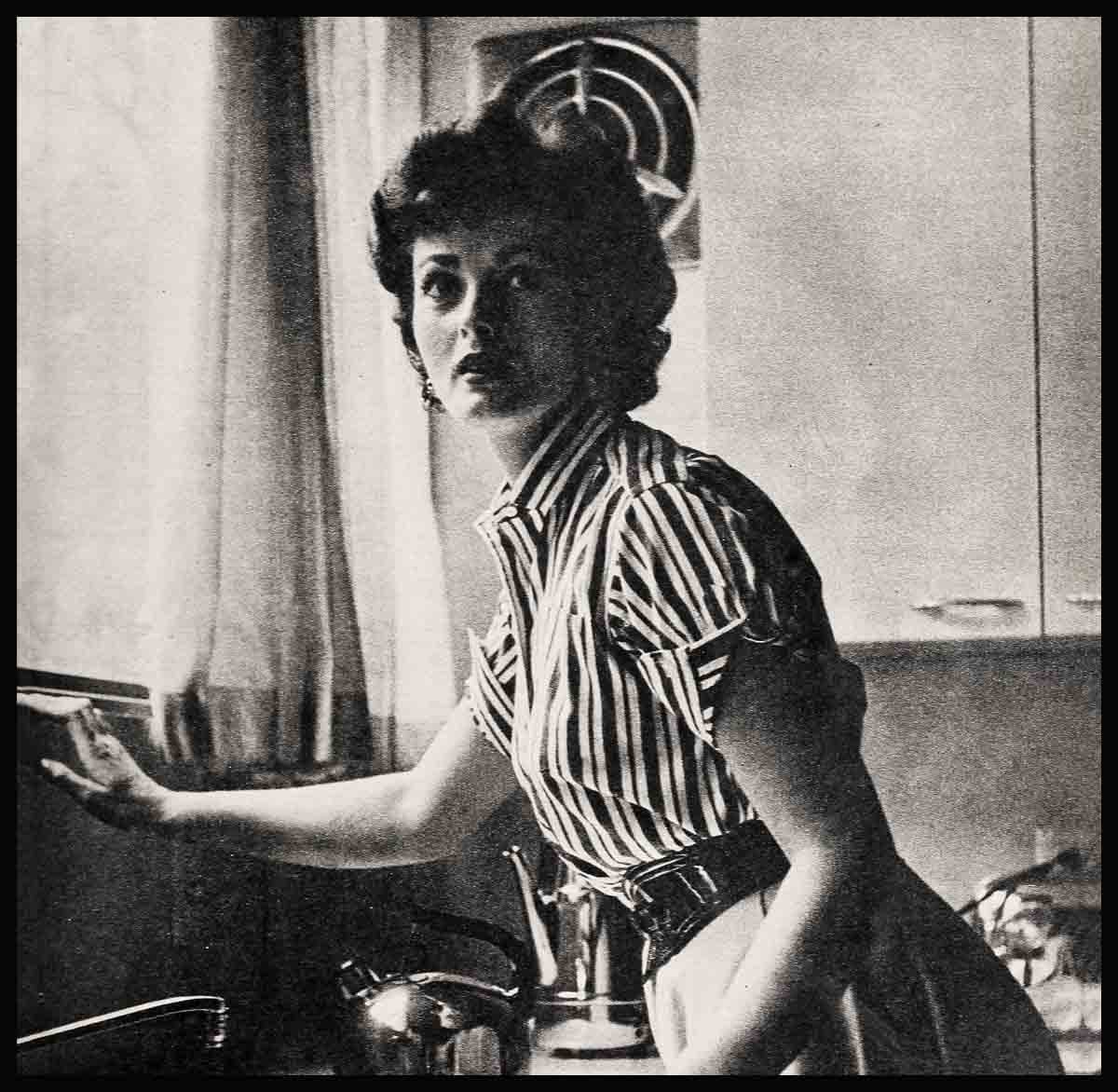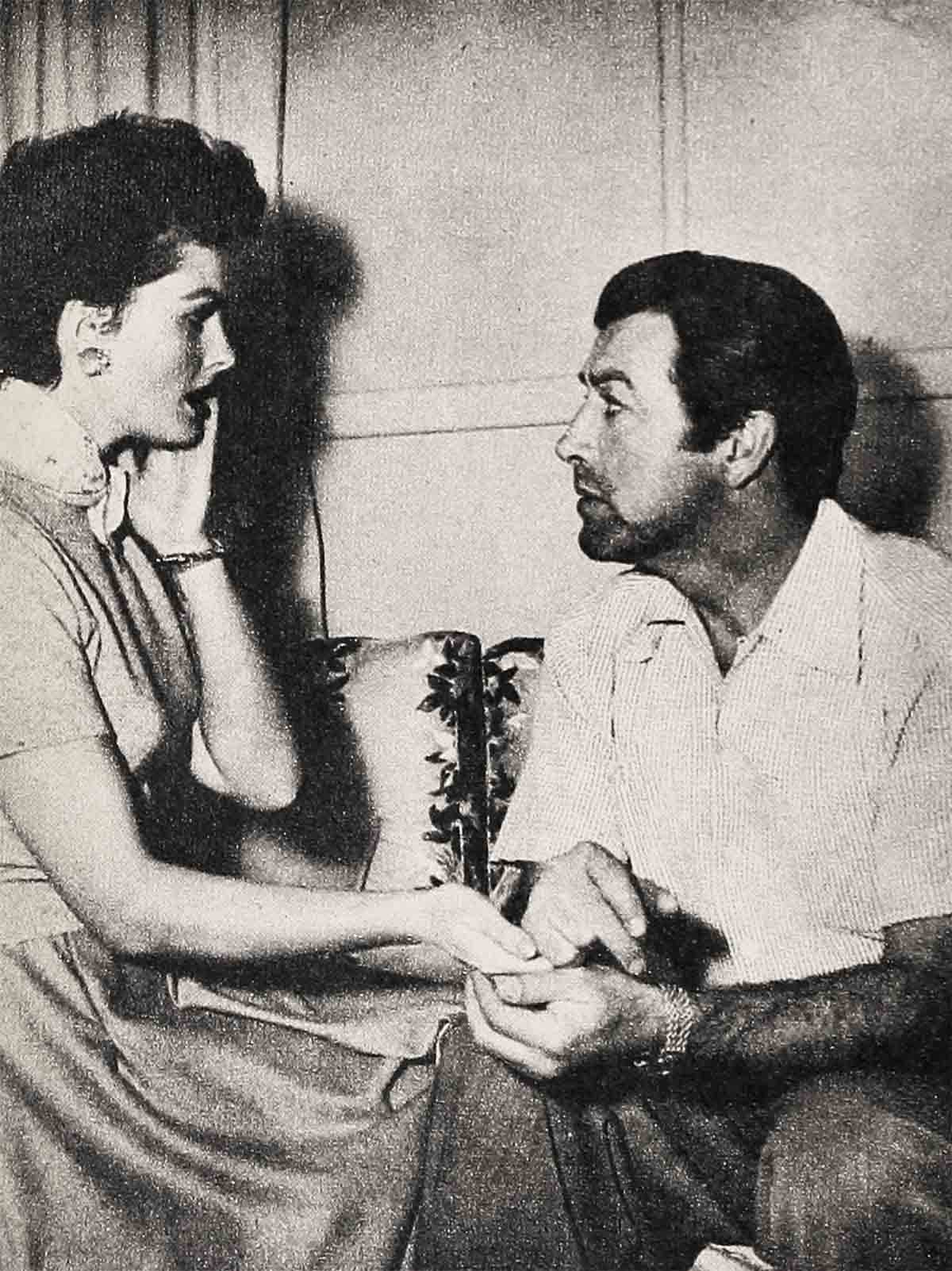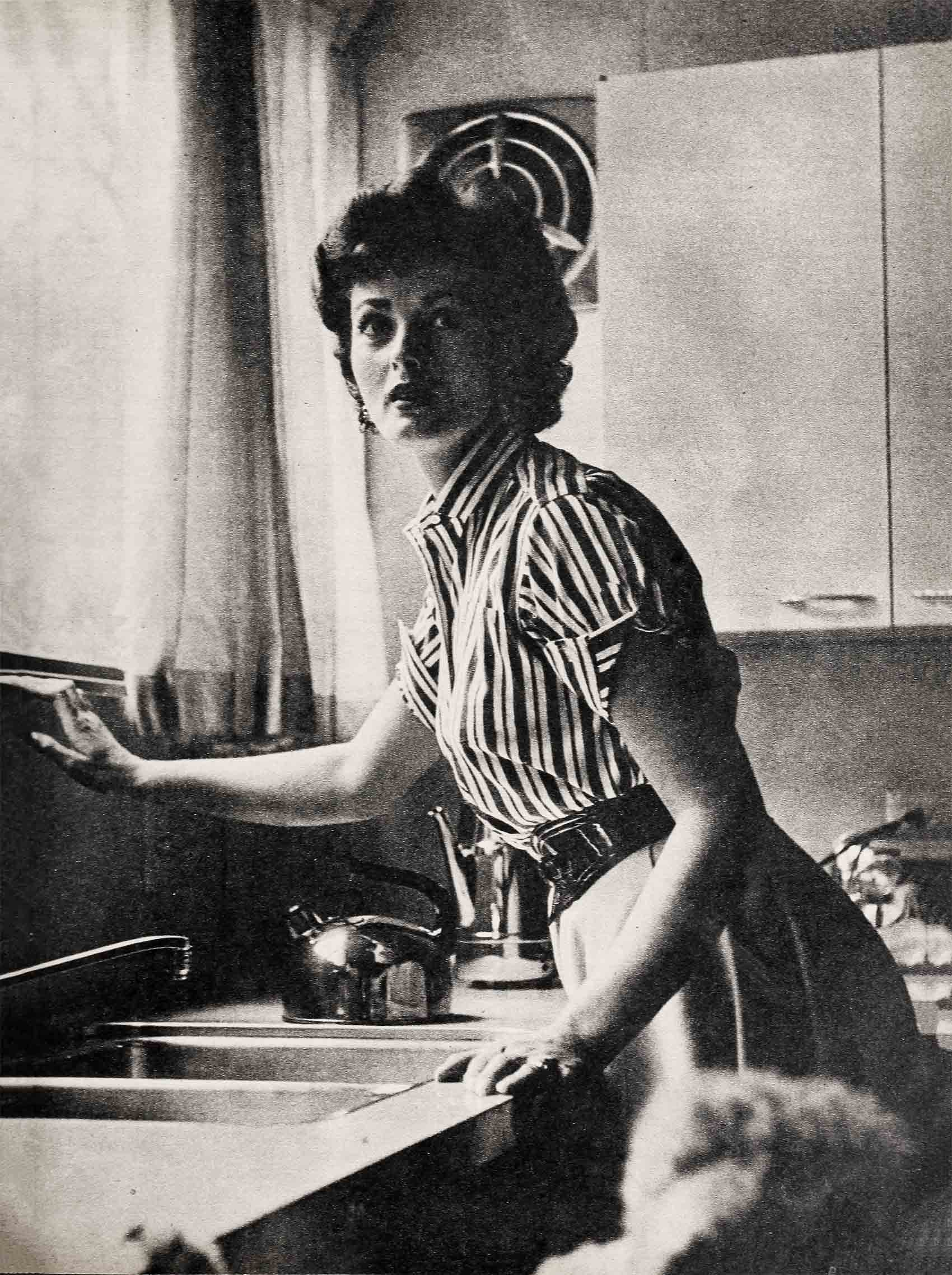
We Applaud Mrs. Robert Taylor
“When we were first married, Bob was afraid I’d go along on his outdoor trips,” laughs Ursula Thiess, whose main job in life is being Mrs. Robert Taylor. “Now he’s afraid I won’t.”
That’s why we applaud Ursula Thiess . . .
“Someone has to cook, you see,” explains this lovely talented woman, with just a hint of laughter. “Besides, I carry the coffee thermos, the cigarettes and sometimes the gun.” Ursula has done more than that. On her first trout fishing expedition she hooked a four-foot salmon, a bigger fish than Bob has ever snagged in his life. She’s also bagged some fat ducks even though her fingers were half frozen when she-yanked the trigger.
Now—and this is the point—none of this rugged stuff sends Ursula into a state of ecstasy, especially when—as happened last year—she took the kids to the cabin and a snowstorm whirled up, the water pipes froze, the power went off, and a bear snuffled around all night outside the door. But Ursula knows what a companion-craving guy her husband is. And so far, Ursula has been right by his side—not only on every sporting trip but on every location, too.
Actually, statuesque Ursula Thiess is every bit as much of a city girl as a girl could be. A svelt model and European movie actress before Bob ever spied her, she is also a continental at heart, far more at home and happy at the theatre, opera or urban pleasure spots than she is frying venison over a campfire.
But the difference is that she owns a hausfrau instinct to obey and please her lord and master—even in departments usually jealously considered strictly personal with most American wives! Bob, for instance, picks out all of Ursula’s dresses—usually solid blacks, reds or whites—and even dictates her hairdo, still just as it was when he met her—shaggy bangs in front but long, pulled back and bunned up behind. While that’s not the height of fashion right now she wears it contentedly because never-changing Bob sees her romantically that way.
But, perhaps more than any other reason, we aplaud Ursula because she is willing to give something up . . . to make her guy happy.
But Ursula has made the sacrifice of practically renouncing a very promising movie career because her husband doesn’t believe in wives working.
“I acted until the time I was married,” she explains, perhaps just a little wistfully. “Besides, I’ve always been awfully I independent.” Ursula was first married at seventeen and at twenty-two was supporting herself, two children and her mother. “I like responsibility,” she admits. “I would like to do just a picture every two years, enough to give me money for birthday presents and Christmas . . . but Bob has a different point of view. He wants me there when he gets home.”
Nancy Davis Reagan—Ronnie’s wife, and one of Ursula’s closest friends, remembers that— “Bob said to me once, ‘I don’t want Ursula bothered with worries about what her director said to her. I don’t want a wife who’s worked all day and comes home so upset or tired with the problems of movie making that she can’t be a good wife and mother.

First in her heart. . . .
Ursula is wisely wary of any movie job that would disturb her home life or involve her in distant locations. Twice what looked like perfect answers—teaming with Bob in pictures—fizzled after Bob had been pretty well talked into consent: Kay Kendall’s part in Quentin Durward and then The Power And The Prize looked ideal for a Taylor family affair, but when it came down to cases Bob wasn’t really happy about a career for her. “I think he’s afraid I’ll wreck his picture,” she suspects. “He’s such a perfectionist.” The clincher he usually tosses at the critical point is, “I can’t afford to let you work, Ursula. Ups my income tax and costs me money.” In any event, the issue has never come right down to an impasse yet.
It never will, because making Bob a comfortable, happy home is Ursula’s first job . . . and first in her heart. . . .
That home is a beige stone and white wood farm style house in Pacific Palisades, built on an ocean-view lot that Bob picked out and bought before Ursula ever spied it. Its biggest luxury feature is a bedroom for each member of the family, if you don’t count Henry, Bob’s golden retriever, and Pappy, a poodle Ursula acquired before she was married, “when I needed a man around the house pretty badly.” There’s also a pool where the whole gang swims—sometimes including the pups! And an indoor barbecue of which Bob is stubbornly proud. Although he banged away on the roof and elsewhere when the house was a-building, the big brick grill was the only part of the place he personally designed. First night they tried it out with a barbecue party, billows of smoke sent the guests stumbling outdoors choking and gasping! Just the same Bob loves to use it—preferably after a cocktail or two to neutralize the carbon monoxide!
Wowing her husband
Bob, Ursula and their brood moved in a couple of years ago with “just a few ashtrays,’ says Ursula, but by now it’s furnished comfortably enough for the casual kind of living they like. The pattern of living set right after Bob and Ursula were married. That’s when their neighbors, Dinah Shore and George Montgomery, called up about dinner time and invited, “Come on over—we’re just putting on some steaks.” Ursula already had dinner cooking but a relaxed invitation like this really impressed Bob. Before, he’d always thought dinner parties had to be planned, formal affairs. Now the call-up-and-drop-over type of social life is about the only kind he’ll go for. Regular customers at the Taylor house include Ronnie and Nancy Reagan, Bob and Dorothy Mitchum, Eleanor Parker and her artist husband, Paul Clemens, the Ralph Cousers and Morgan Maree, Bob’s business manager. If the indoor barbecue smokes too much, Ursula whips up a single-plate supper featuring some of her German goulash concoctions with potato pancakes. That always wows her husband. “I can’t speak a word of German,” he assures her, “but what Germans eat sure gives me the message.”
On his first flight to Europe with Ursula after they married he tapped back, “I’m rounding up my little Krauts and trying to make an impression. But it’s rough. So far I’m using Indian sign language.”

Just making him happy
The little Krauts aren’t so little any more; moreover, they’re no longer Krauts. Manuela, now thirteen, goes to a girls’ boarding school in Claremont, California, and Mike, eleven, drills at BLACK-FOXE MILITARY SCHOOL in Hollywood. By now neither has much accent left and Ursula even less. Just to make things official, a few weeks ago Ursula took her oath as a U.S. citizen. As usual, none of Bob’s friends or studio colleagues knew about that momentous event until they read it in the papers. What they have known for some time, however, is that Ursula Thiess and her kids have brought to Bob Taylor’s life what a once lonesome man unhappily lacked. If Bob gets the little girl he wants next, things will be pretty complete. Then the only thing that would make Bob’s life perfect would be a few gray hairs—to banish that beautiful tag which has clung to him all these years, to his annoyance.
But if fretting’s required to sprout those silver threads, then Bob’s prospect of relief seems pretty dim. When a score of years as a movie star, flying in a world war and two sessions as a married man can’t raise a worry wart, even the Atomic Age should hold no terrors. Nor does Bob figure on changing at this late date. “The way I live may seem dull to some people,” allows Bob, “but the way I am—it’s the way I like it.”
And the way he is—that’s the way his wife loves him. That’s why she married him . . . that’s why she isn’t trying to change him. Just trying to make him as happy as she knows how to, by giving her family, her husband, the kind of life they both want. . . .
Yes, Ursula Thiess Taylor is a woman to be applauded. She has made a new life for herself in a strange land and has come to call this new place home. She has adjusted to living happily with her husband and is a devoted wife and mother. “What woman,” Ursula asks, “could possess—or ask for—anything more?”
THE END
Bob’s now in MGM’s TIP ON A DEAD JOCKEY and will soon be in MGM’s SADDLE THE WIND.
It is a quote. MODERN SCREEN MAGAZINE NOVEMBER 1957




